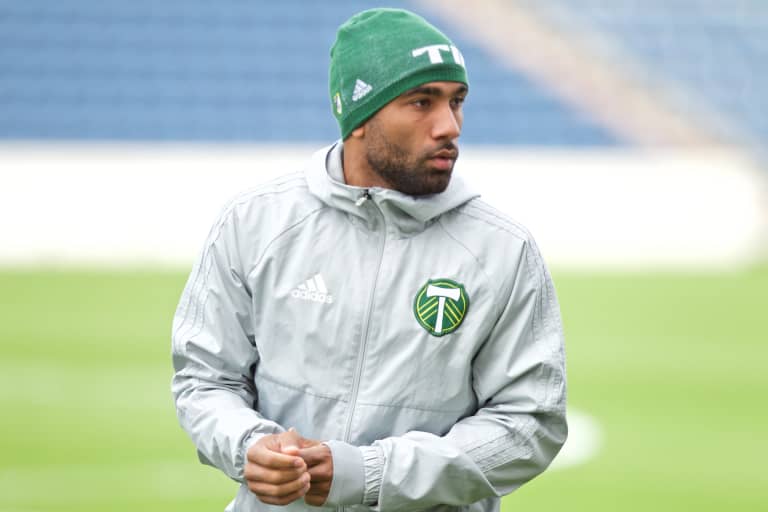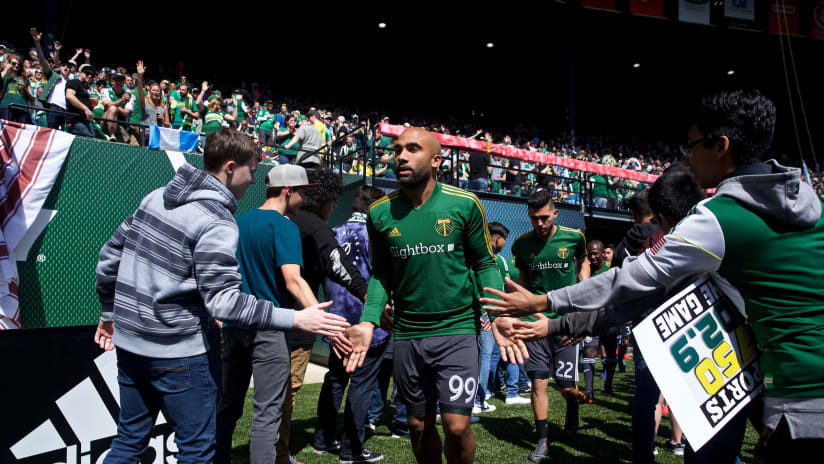When Samuel Armenteros returned to the Netherlands, he was ready to rejoin the soccer world.
It was just over two years ago, in the spring of 2016, when the Swedish striker had just finished his year in Azerbaijan. He knew his time with Qarabag, in Baku, would take him out of the spotlight, but he’d earned the reward, he felt. As a 25-year-old, coming off an 11-goal season with Willem II in the Dutch Eredivisie, he had a chance to cash in. Besides, he ended up loving his time in Baku, saying the team in Azerbaijan’s oil-rich capital gave him “everything you could wish for.”
What commenced on his return was a cross-section of life at the heights of European soccer: instant success; fast fame; the frenzy of a hungry transfer market. From his homecoming at a club which put him on the map to a dream move to Serie A, Armenteros encountered every high and low that the European club scene can offer.
Now, 24 months later, the Gothenburg-born forward is settling into a new home half-way across the world, all the while knowing this is what he signed up for. And the newest Portland Timbers striker wouldn’t have it any other way.
“That is soccer,” he says, a common refrain for the soon-to-be 27-year-old. “Anything can happen in a split second.”

Armenteros’ latest ride on soccer’s roller coaster began two years ago, though he had already been through a career’s worth of ups and downs. After spending his youth with Dutch side Heerenveen–Michael Bradley’s first European club–Armenteros moved to Heracles Almelo, where 32 goals over his first four professional seasons earned him a transfer to Belgian power Anderlecht. From there he went to Feyenoord, had his breakout season with Willem II, then got his chance in Baku.
Between 2008 and 2016, Armenteros was a part of six different clubs. He went from a 2009 release from Heerenveen to, three years later, being lured by a Champions League-level club. Three more years after that, he was playing his soccer his Azerbaijan.
And once that was over, it was time to reestablish himself in Europe.
“I decided to go back home,” he said, about his move back to Heracles in August 2016. “I took that step back home to a club that I was familiar with, where I played before. I said, ‘They know what they’re getting by bringing me back, and I know what to expect from the club.’”
The reunion was more successful that either side could have imagined. Whereas Armenteros’ previous high for goals was the 13 he scored in his final season in Almelo, he scored 21 in his return. Come March, the option for the second year of his deal was picked up, and his home country’s press was seeing his career in a new context: the Swedish national team.
“When it came to the stats, the amount of games, the guys who were already in and me making my way into the team,” Armenteros says, “I scored three times as much as some of the guys who were already in the team. They had scored six, eight goals that season. I was at 21. They were playing in the national team while I was still waiting for my chance to get in, so the people were like, we have to rate the players by the form they’re in right now.”
On June 13, 2017, two weeks after his 27th birthday, Armenteros made his senior international debut, coming on late and scoring an equalizing goal in Sweden’s 1-1 friendly draw with Norway. Two months later, Armenteros was back in the team, dressing for a set of World Cup qualifiers and coming off the bench in his country’s 3-2 loss at Bulgaria.

For many players, reaching their national team is the high point of their career, but on a club level, Armenteros has just experienced another major move. On August 30, 2017, roughly one year after his return to Heracles, the new Sweden international made a move to Italy, ending a long, active transfer window with a two-million-euro switch to Serie A’s Benevento.
“The next-to-last day [of the transfer window,] I was with the Swedish national team, away, playing a World Cup qualifier,” he remembered, “and this choice to go to Italy came out of nowhere. It was my last choice, of staying there or taking that step. But it was new. I didn’t know anything about the club. I didn’t know anything about the situation. So, I tried to get as much information as I could in a day.”
Heracles had been approached by team after team since the end of the previous season, he says. Each time, their asking price was far more than Armenteros’ suitors wanted to pay. As the transfer deadline approached, and Benevento became his final option, Armenteros decided to take a chance, because on the heels of a career year -- with a move to a top-five league staring him in the face -- he felt he’d earned the chance to step up.
The move became the apex of his year-long ascent. The problem with an apex, though, is that it always precedes a descent, and just like others strikers who’ve found themselves newly promoted teams, Armenteros struggled to reproduce his numbers. Starting the season with 15 straight losses, Benevento scored only five times, with Armenteros scoring against Sassuolo in one of his only five Serie A starts.
“The move I made to Italy, I made it for the national team,” he remembers. “I got offers to play in the Middle East, to play in China. I could have gotten another pay check. But I talked to the national team coach, I explained the situation, said ‘How do you feel?’
“He was honest, just like I expected him to be, and he said ‘We are going to the World Cup. That’s our goal, right now, and our main focus is staying in range at least so we can follow you in a country that we know that’s growing, or we can keep track of you.’”
It ended up being bad advice. Come December, Benevento was on their second manager, destined for relegation, and still hadn’t carved out playing time for their record signing. When the January transfer window opened, Armenteros had only played 429 minutes, going a full 90 only once in the 12 times he suited up.
“With every week that passes by, say to yourself: ‘I’m the best player here,’” he remembers. “Why am I not playing every single game?
“It’s OK if you play 10 out of 17, or 10 out of 20. When you’ve made five starts and you keep on losing, your team still haven’t scored any goals? And you know the only reason they brought you in is to score goals, but you still haven’t gotten a chance to prove it? That was when I started questioning the situation. I wanted to make a move where I could play.”

Too much hung in the balance for Armenteros to stay put. He had reached the prime of his career, and in January, a crack at Sweden’s World Cup squad was still a possibility. Thankfully, by mid-January, a new home seemed to be found.
But thanks to a technicality in FIFA’s transfer rules, the long-time Eredivisie striker wasn’t allowed to make a move back to the Netherlands. As part of getting fit before the season, he had appeared in a competitive appearance for Heracles’ second team in August, and FIFA’s rules bar players from appearing for three teams in one season when those teams are all on the same schedule. If Armenteros was going to get out of Italy, he was going to have to go someplace on a different calendar, like China, the Middle East, his home nation of Sweden, or Major League Soccer.
That’s how the two-time Sweden international found his way to Portland.
“You never know,” Armenteros says, again about the trails of the soccer world. “In soccer, you really never know how things will end up. Of course, this isn’t the place that I would have expected me to be, but I’m really happy to be here, to tell you the truth.”
His arrival was abrupt, going from Italy to the Netherlands to Portland over a week’s time in February. Come the start of the regular season, he’d barely had a chance to settle into the squad. But over the last two weeks, with Armenteros playing a key part in each of his team’s game-winning goals, we’ve seen flashes of what took him to Italy. And to Azerbaijan. And to Belgium before.
Amid two years of chances, the Rose City is just the latest stop on Samuel Armenteros’ roller coaster.












